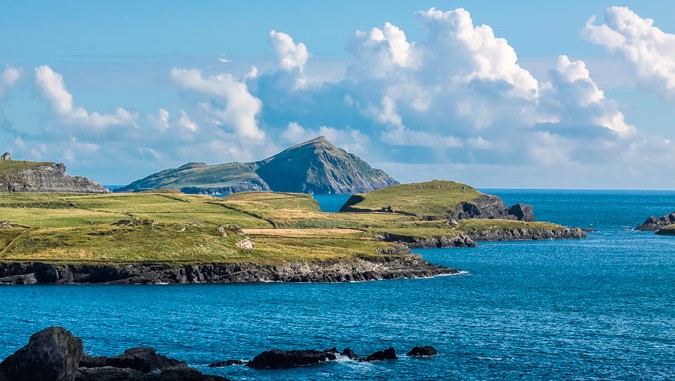I have long been fascinated by islands. I remember, as a boy, taking my father’s small boat out to unpopulated islands off West Cork. I would step ashore like Robinson Crusoe on to a perfect, silent beach. There was always a profound serenity on these little islands, the troubles of the world were at a remove. The blue perfect sea provided a perfect, natural moat against all that was hurried, harried and hasslesome out in the broad world.
I used to work on sailing boats in my early 20s. I always found excuses to anchor off islands, and go ashore. I loved to anchor in the treacherous Blasket Sound, and soak in the abandoned village that whispered of the deep memories of an Blascaod Mór.
Valentia [above], Cape Clear, Sherkin and Heir island all became regular haunts when sailing with friends or tourists along the south west coast. A romantic urge to live on one of these beautiful outposts never quite left me. We as a family had the joy of house-sitting a very special cottage on Sherkin island for long periods a few years ago. The kids will always remember the experience of being storm bound for days at a time and helping us to prepare simple, self-sufficient meals with eggs from the hens, crabs from the harbour, and vegetables from the garden.
My wife’s medical training has led us to again live on an island now, the Isle of Wight, off the south coast of England.
Yet whereas Sherkin had only about 90 souls on board, the Isle of Wight has almost 150,000. While Sherkin had no shop the Isle of Wight has Sainsbury’s, Asda, KFC and McDonalds.
I remember carrying a pane of glass across Sherkin for a repair in my gloved hands. The Isle of Wight, by contrast, has a B & Q superstore, and myriad local hardware shops. Sherkin had no doctor, while the Isle of Wight has a fully kitted out hospital. This is island living with all the mod cons.
Yet it remains an island, and it very much feels like one. During a storm, the ferries are cancelled, and we become isolated. Despite the rapid ferries and hovercraft that connect us to the mainland, the sense of being in a place apart remains.
We live at a remove from the 21st Century, for better and worse. Wandering amongst the thatched cottages of our village, it could be the 19th. The concerns and stresses of the modern world are held at bay by the Solent.
Things move slower and people have more time. When returning from a few days work in in Dublin or London, you cross the water to a place where time flows easy.
The decision to spend time here was made with the kids in mind. Childhood only comes once and, along with happy memories of city life in Dublin, we wanted their memories to be washed over with nature, golden beaches with breaking waves, and for them to be ensconced for a while the life of a small, happy village. My eldest boy says of living on an island, “It makes you feel cosy and safe. It’s nice to know there’s water all around you when you are going to sleep, sometimes it feels like you’re getting rocked about as you fall asleep.”
Status
All Irish people are islanders, of course. Yet our island is large and populous enough that we forget that status, until we have to leave it. Then, the necessity of travel by boat or plane reminds us sharply that we are islanders.
I married an Englishwoman, which has meant that for 10 years and more we have been routinely travelling back and forth across the Irish Sea, with the kids in tow, a number of times each year.
Yet living on an island off an island doesn’t isolate, rather the sea connects us. With family from Ireland, Scotland, England and Wales, we are home across the archipelago, and we are forever happily hopping on and off boats.


 Rory Fitzgerald
Rory Fitzgerald Valentia Island
Valentia Island 
